Fairfax County ecologists provide free high-quality, innovative educational programs and teaching tools to audiences ranging from K–12.
Public Works and Environmental Services Alert:

Fairfax County ecologists provide free high-quality, innovative educational programs and teaching tools to audiences ranging from K–12.
Have you ever wondered what a freshwater ecologist is? Now you can find out! This educational video series shows the many different areas of work and study for freshwater ecologists including biodiversity, stormwater runoff, benthic macroinvertebrates, and more!
Book a local ecologist to visit your school to host one of the many award-winning programs offered by Watershed Education and Outreach.
Ages: Grades 4-12.
Program Length: 40 minutes per class.
The Revitalize, Restore, Replant! (R3) program transforms existing stormwater facilities (like bioretentions and dry ponds or yard inlets) on Fairfax County Public School FCPS campuses into outdoor classrooms. At no cost to schools, county ecologists introduce students to stormwater and watershed ecosystem management and lead a hands-on native plant installation. Plant species are chosen to complement existing programs of study, allowing plantings to be used as outdoor teaching tools for all grade levels. Fairfax County provides native plants, plant ID signs, and all other necessary materials for this event.
Due to the popularity of this program, the earliest available slot for R3 planting may be two years out. For more information, please review the Revitalize, Restore, Replant FAQs
Ages: High School. Program Length: 90 minute lab.
In the Stream Crime Investigation (SCI) Lab, students join a stream crime prevention unit to track and stop common pollutants from entering our waterways. This lab couples the informative nature of presentations with the hands-on experience of lab exercises, illustrating the connection between residents’ behaviors on land and their impact on local waters. SCI lab materials are available for free for other jurisdictions.
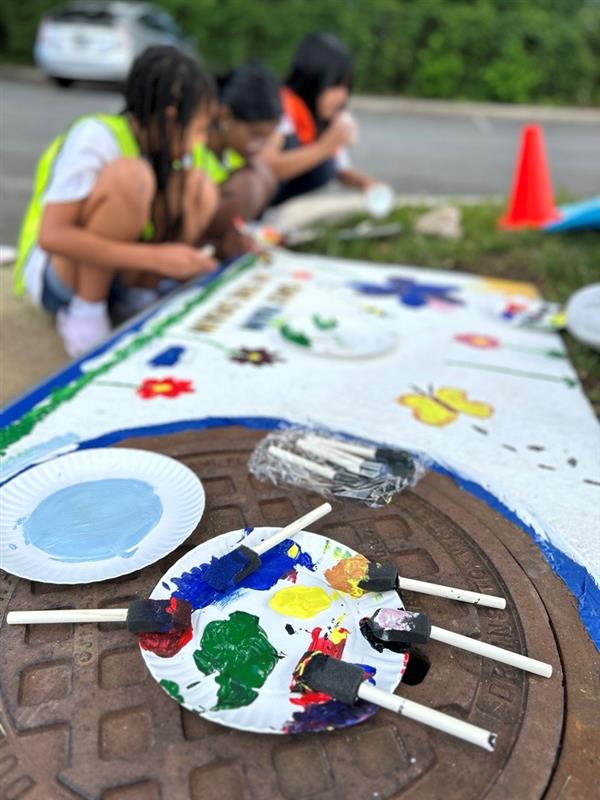 Ages: All. Program Length: 1 hour.
Ages: All. Program Length: 1 hour.
Only rain should go down the storm drain! Turn your storm drains into art with the storm drain stenciling program. Staff will prepare the storm drains for painting and provide acrylic paint and brushes for the event. From elementary school to high school, this program connects students to our local environment and provides them with an opportunity to tell their stewardship story through paint. Great for in school or after school clubs. Please note this program can only be done on public facilities. Applicant is responsible for acquiring permission to paint the storm drains.
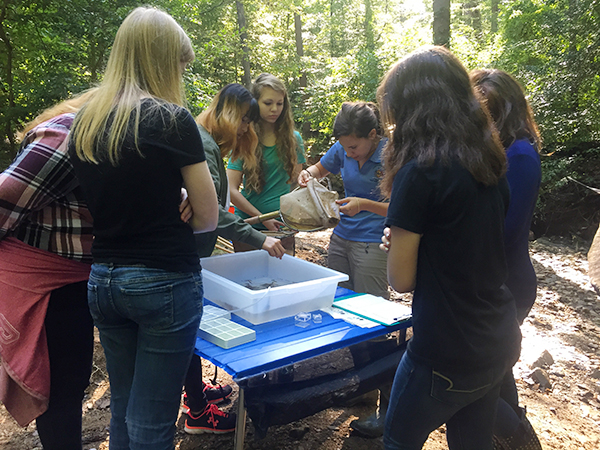 Ages: High School. Program Length: 45 minutes.
Ages: High School. Program Length: 45 minutes.
Program availability contingent on season and weather. Students learn how to identify live stream organisms using a key and how to determine the health of a stream based on the critters they find. While some critters can tolerate pollution, others need clean water to survive. Based on the number of sensitive, moderate and tolerant organisms in the sample, students give their stream a grade. Will your stream be an A+ or an F? The school is responsible for finding an appropriate stream site for the event.
Alternatively, staff are available to "stream from a stream" where students participate virtually in a stream monitoring event.
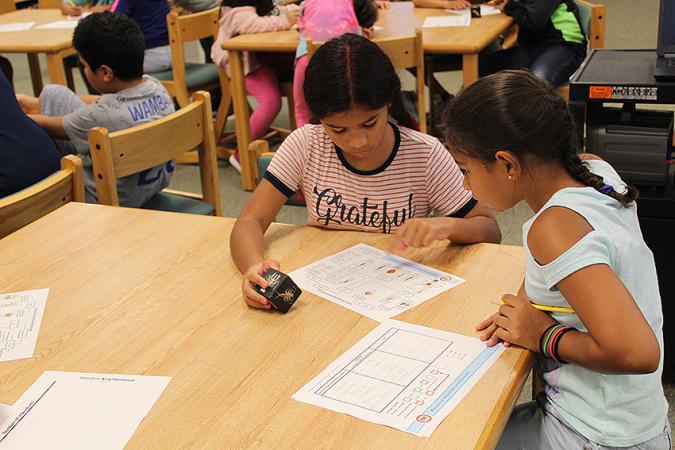 Ages: Grades 4-12. Program Length: 40 minutes.
Ages: Grades 4-12. Program Length: 40 minutes.
Students learn how to identify different stream organisms using a stream critter cube and a key to determine the health of a stream. While some critters can tolerate pollution, others need clean water to survive. Based on the number of sensitive, moderate, and tolerant organisms in the sample, students give their stream a grade. Will your stream be an A+ or an F? This program is a good alternative to the Live! Stream Critter Lab for younger students or when the weather does not permit students to travel to a stream.
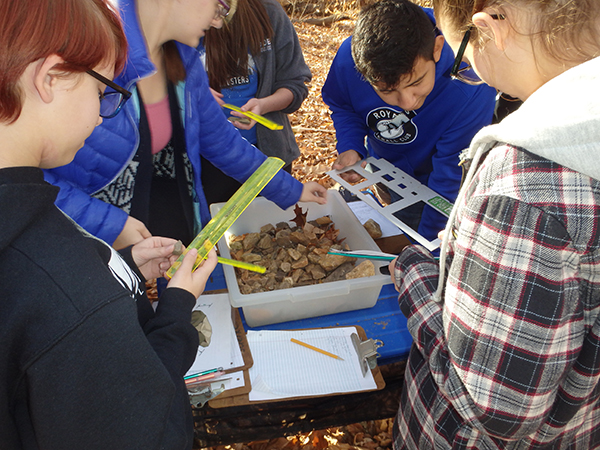 Ages: High School. Program Length: 45 minutes.
Ages: High School. Program Length: 45 minutes.
Fluvial geomorphology is the study of the form and function of streams and their interaction with the surrounding landscape. In this lab, students will learn about physical characteristics of streams, how they can change over time, and how they are monitored. This lab can be held outdoors at a stream or in your classroom. It can also be paired with the Stream Critter Lab for a full 90-minute lab.
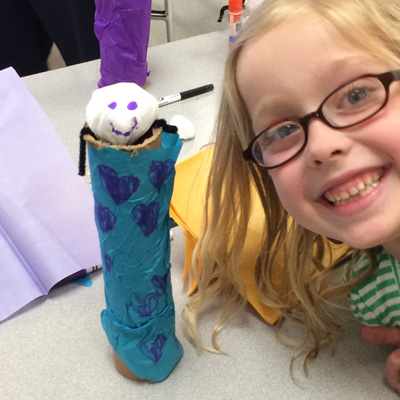 Ages: Elementary School. Program Length: 30 minutes.
Ages: Elementary School. Program Length: 30 minutes.
This activity combines art and science to explore the life of one of our local stream insects – the caddisfly! In this activity, students learn about caddisflies, the houses they make, and how they relate to stream health. Students then make their own caddisfly and house out of craft supplies.
The Create a Caddisfly program is a great STEM or STEAM night activity and fulfills requirements for the Bug Badge (Girl Scouts) or the Insect Study (Boy Scouts).
 Ages: Upper Elementary School. Program Length: 40 minutes.
Ages: Upper Elementary School. Program Length: 40 minutes.
Oh, what a tangled web we weave when trying to teach food webs. In this program, students learn about producers, consumers, and decomposers in the Chesapeake Bay. In the interactive portion of the program, students become part of the food web and learn how each species plays an integral role in our environment and what happens when human interactions throw off a balanced ecosystem.
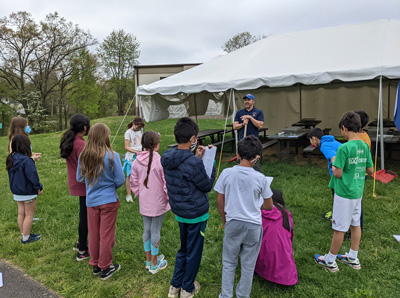 Our team of freshwater ecologists are available to present to your students in-person or virtually. Staff are available to discuss a wide range of topics, including watersheds, assessing the health of our streams and lakes, Chesapeake Bay, food webs, stormwater management, influences of human activity on ecosystems, science fair projects, and more! For large classes, it is helpful to send a list of questions ahead of time.
Our team of freshwater ecologists are available to present to your students in-person or virtually. Staff are available to discuss a wide range of topics, including watersheds, assessing the health of our streams and lakes, Chesapeake Bay, food webs, stormwater management, influences of human activity on ecosystems, science fair projects, and more! For large classes, it is helpful to send a list of questions ahead of time.
Ages: Elementary and Middle School. Program Length: 20 minutes.
The enviroscape is a three-dimensional interactive model of a watershed that can be used to show how point and non-point source pollution enters our waterways. The enviroscape can be checked out by local teachers and other non-traditional educators. WEO staff is available to help train how to use the enviroscape model should you need assistance.
Work at your own pace and explore our environment!
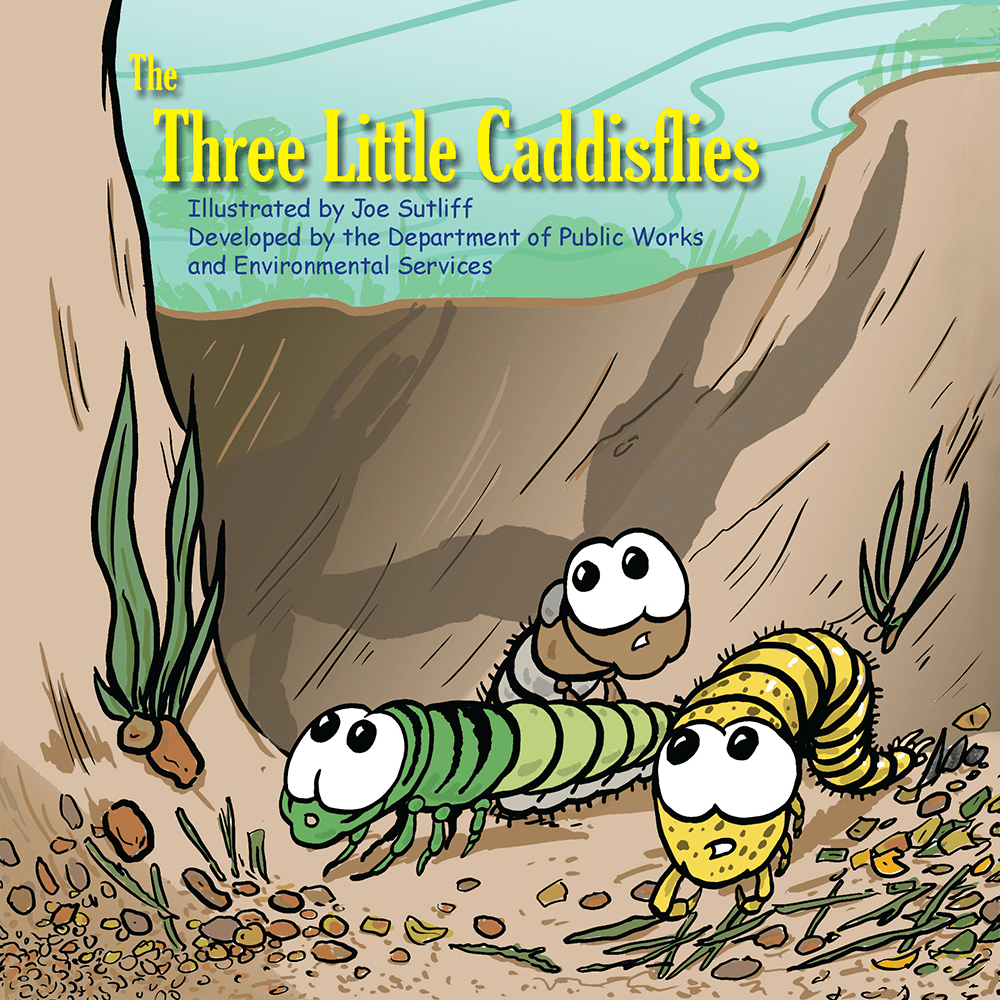 The Three Little Caddisflies is a book that introduces kids to the world of the three caddisflies, an important aquatic insect that makes unique houses out of stones, sticks, or leaves. Find out who is chasing Cass, Cam, and Cai through their stream and how they hide from this mysterious baddy! Copies available upon request.
The Three Little Caddisflies is a book that introduces kids to the world of the three caddisflies, an important aquatic insect that makes unique houses out of stones, sticks, or leaves. Find out who is chasing Cass, Cam, and Cai through their stream and how they hide from this mysterious baddy! Copies available upon request.
Ages: Elementary and Middle School. Program Length: 20 minutes.
Use the On Your Own Create a Caddisfly instructions to DIY a caddisfly! This program is also available at select libraries.
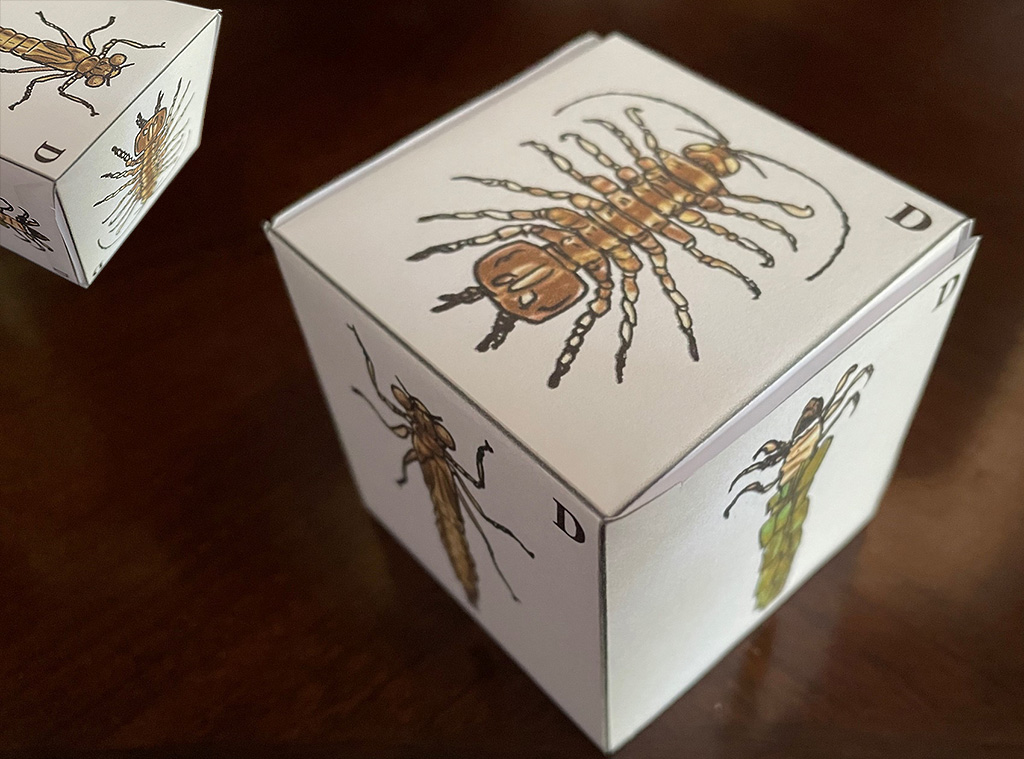 The On Your Own Stream Critter Cube Lab includes multiple templates to make your very own stream critter cube to monitor our streams from anywhere! Users will learn how to identify different organisms to check the health of a stream using their critter cube and a key. While some critters can tolerate pollution, others need clean water to survive. Users roll their cube to “sample” a stream and give it a grade based on the number of sensitive, moderate, and tolerant critters they get. Will your stream be an A or an F?
The On Your Own Stream Critter Cube Lab includes multiple templates to make your very own stream critter cube to monitor our streams from anywhere! Users will learn how to identify different organisms to check the health of a stream using their critter cube and a key. While some critters can tolerate pollution, others need clean water to survive. Users roll their cube to “sample” a stream and give it a grade based on the number of sensitive, moderate, and tolerant critters they get. Will your stream be an A or an F?
Stormy the Raindrop is an award-winning champion of clean water. Stormy teaches kids ways to keep our rivers and stream clean through activity books, a puppet show video, and in person at public events.
Welcome to the amazing world of field journals! This journal provides a mix of activities to help you discover more about your neighborhood, school, and the outdoors. It also has blank journaling pages for you to record what you see in the natural world. The field guide below can help with some of the activities.
Do you have a fish that you want to identify? There are at least 60 different fish species that make Fairfax County their home. Use our online key to figure out which fish you fished!
Clean water is our most important resource. Learn how drinking water, wastewater and stormwater runoff are managed by separate systems in Fairfax County.
We can still help! For questions on opportunities not listed, or if you would like to check staff availability for a program, please email the Watershed Education and Outreach team or call 703-324-5500, TTY 711.
